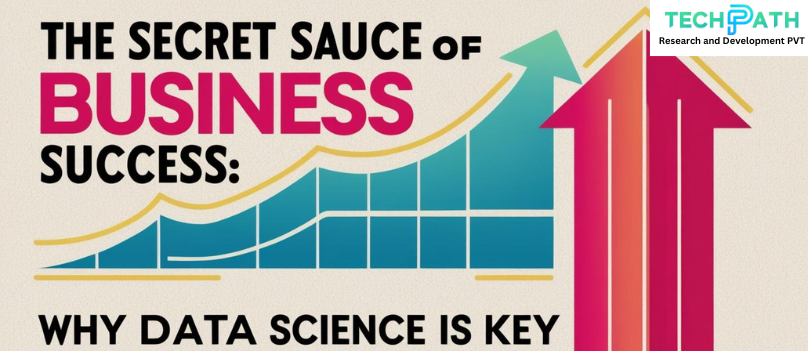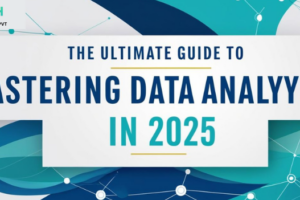
The Secret Sauce of Business Success: Why Data Science is Key
- Date January 21, 2025
Introduction
Have you ever delved deeply into what sparks true success in the unforgiving battlefield of contemporary business? Is it passion? Indeed. Innovation? Absolutely. Tireless commitment? Without question. Yet, woven within this compelling fabric lies an unseen force that distinguishes the industry giants from the rest: data science! In our frenetic digital landscape, companies that adeptly tap into the immense potential of data science don’t merely strive to survive; they ascend, making incisive, informed decisions that ignite energetic growth and remarkable profit margins.
Embark on this exploration of “The Secret Sauce of Business Success: Harnessing the Power of Data Science.” We’ll sift through the complexities of how this powerful tool can fundamentally reshape your strategies—analyzing consumer behavior, fine-tuning operational efficiencies—all while ensuring your organization moves deftly through the hustle and bustle of the marketplace.
“Your journey to phenomenal business success begins now—embrace the revolutionary potential of data science”!
Demystifying Data Science
So, what is this mesmerizing realm we call data science? Envision, if you will, a vibrant melting pot where scientific methods, algorithms, and advanced systems converge to extract profound insights from both structured and unstructured data. Simply put, it’s the alchemical process that empowers organizations to decode the intricate narratives hidden within the vast sea of data swirling around them.
In essence, data science is not merely a discipline but a collective mindset. It encapsulates the courage to explore the uncharted territories of data, embracing the chaos that numbers can represent. Each byte of information carries a story, and every dataset offers a universe of possibilities waiting to be unlocked.
The Essential Ingredients of Data Science
1. Statistics
At the heart of data science lies statistics—the bedrock of robust data analysis. It enables organizations to draw meaningful inferences and makes predictions from sprawling datasets. Without statistics, data is merely noise; it is through statistical techniques that we derive clarity and actionable insights.
Consider the classic bell curve: it visually represents data distribution, showing how individual values relate to the mean. Methods like regression analysis, hypothesis testing, and variance analysis let the businesses analyze trends, forecast and even assess the efficiency of strategies.
2. Machine Learning
machine learning—the enigmatic art of teaching machines to learn from data without explicit programming. Imagine algorithms that adapt and evolve over time; consider them your analytical companions, enhancing your insights with each iteration.
From supervised learning, where models are trained on labeled datasets, to unsupervised learning, where patterns emerge in unlabeled data, machine learning radically transforms the landscape. Take customer segmentation, for instance, where consumers are grouped based on behavior; algorithms detect patterns that human analysts might overlook, unveiling new opportunities for targeted marketing.
3. Data Visualization
Data visualization is the vital craft that distills complex figures into comprehensible visuals. Through engaging charts, graphs, and infographics, dense data eases into captivating stories. The old adage “a picture is worth a thousand words” rings particularly true here; a well-designed visual can communicate insights that volumes of text cannot.
Imagine a dashboard displaying real-time sales metrics; a simple color-coded chart can indicate trends and anomalies at a glance, facilitating quicker decision-making. This visual storytelling enables stakeholders to grasp nuanced data narratives and encourages data-driven discussions across organizational levels.
4. Big Data Technologies
In a world overflowing with information, big data technologies are the contemporary instruments designed to handle and analyze substantial volumes of data effectively. Traditional data processing tools falter when confronted with the scale and speed of big data.
Consider Hadoop or Apache Spark: these frameworks enable the storage and processing of massive datasets across distributed computing environments. They allow organizations to extract value from data that previously seemed too unwieldy to analyze meaningfully. By leveraging such technologies, businesses can unearth insights that drive competitive advantages.
In mastering these elements, organizations can harness the power of data science, transforming raw data into a strategic asset—your winning formula for success! In an age where data reigns supreme, neglecting this digital goldmine is akin to sailing without a compass.
The Imperative Role of Data Science in Modern Business
Informed Decision-Making
The era of decisions based on mere gut feelings is long gone. Today, data science stands as the beacon illuminating the path forward. By examining not just surface trends but digging deep into intricate data patterns, organizations can make strategic choices that minimize risks while maximizing rewards. Picture having your very own crystal ball—data science functions as that elusive foresight!
How does this unfold in practice?
- Dissecting historical sales data to anticipate future revenues enables businesses to plan effectively and allocate resources judiciously.
- Gathering customer insights helps refine products and services, ensuring alignment with consumer desires.
- Unraveling emerging market dynamics keeps organizations attuned to competitive shifts, enabling proactive strategy alterations.
Having effective data science strategies in your organization’s arsenal makes it possible for the organization to transform from being on the receiving end, towards being more strategic in preparing for the tides of the future. Where uncertainty is the new black and the black is the reality, data science steps forward and become a compass in the middle of the storm.
Enhancing Customer Experience
Customers epitomize the essence of every business. Delivering an extraordinary experience becomes vital—the golden ticket to cultivating loyalty and encouraging repeat transactions. Here, data science masterfully unravels the preferences, behaviors, and needs of consumers.
Personalization Strategies:
- Recommendation Engines: Think of the likes of Netflix and Amazon—vast data-driven systems artistically suggesting products or content tailored uniquely to each user’s past behavior. These algorithms analyze viewing histories, purchase patterns, and even navigational habits to encode highly personalized recommendations.
- Customer Segmentation: Classifying customers into distinct groups based on shared characteristics enables intensely targeted marketing strategies. For example, understanding that certain demographics prefer eco-friendly products can guide promotional efforts, thus amplifying effectiveness.
- When clients feel genuinely seen and valued, their allegiance skyrockets! The transition from a generic approach to a tailored experience can be the tipping point between a one-time buyer and a devoted brand advocate.
- Streamlining Operations: Every enterprise, irrespective of size, grapples with operational frameworks—from inventory management and demand forecasting to effective staffing solutions. Enter data science, casting light on avenues to optimize processes, eschew waste, and bolster efficiency.
Paths to Operational Excellence:
Predictive Maintenance: Through sensors and insightful data analysis, organizations can foresee equipment maintenance needs, saving valuable time and resources. This anticipatory approach mitigates downtime, enabling operations to run smoothly.
Supply Chain Optimization: Delve deeply into data to pinpoint bottlenecks, ensuring seamless product flow from point A to point B without disruption. Utilizing predictive analytics can forecast demand spikes, aligning inventory levels accordingly and minimizing stockouts or overstock scenarios.
Optimized operations liberate you to innovate, breaking free from the shackles of logistical entanglements! By refining your operational strategies, you create space for creativity and growth, allowing fresh ideas to flourish without constraint.
Igniting Innovation
In a realm where change is the sole certainty, fostering innovation is essential for staying relevant. Data science carves pathways toward new ideas, products, and services—analyzing trends while forecasting impending market shifts.
Innovation in Action:
Market Analysis: Unearthing remarkable opportunities and hidden market gaps through meticulous data scrutiny can lead to groundbreaking product launches. By continuously monitoring consumer sentiment and competitive positioning, organizations can swiftly identify areas ripe for exploration.
A/B Testing: Trying out different product versions unlocks insights into customer preferences before a full-scale launch, facilitating nimble pivots. This iterative approach reduces the risk associated with new offerings, allowing for adjustments based on real-time feedback.
With data as your compass, navigating the waters of innovation becomes not just bold but strategically astute! The capacity to adapt rapidly and harness data-driven insights can spell the difference between stagnation and dynamic growth.
Real-World Triumphs of Data Science
Let’s examine some champions of data science and the remarkable feats they’ve achieved.
Amazon
An e-commerce powerhouse and data-savvy giant. By harnessing an extensive pool of customer data, Amazon masters personalized product recommendations, elevating user experiences while driving awe-inspiring sales figures. Their recommendation engine accounts for a significant portion of their revenue, showcasing how critical data science is to their business model.
Spotify
Ever considered how Spotify seemingly knows your favorite tracks even before you do? This platform employs sophisticated data science to analyze listening habits, curating personalized playlists that keep users utterly engrossed. By leveraging collaborative filtering and natural language processing, Spotify continuously refines its music suggestions, solidifying user loyalty.
Netflix
Beyond just providing recommendations, data science influences Netflix’s content creation strategies. By dissecting viewer preferences, they strategically direct investments into projects likely to charm and retain subscribers. Their ability to predict what content will resonate leads to informed decisions about which series or films to fund, reshaping the entertainment landscape.
The Challenges of Data Science Implementation
But this captivating journey into the realm of data science isn’t devoid of hurdles. Let’s illuminate some prevalent challenges:
Data Quality
This economistic approach could not be applied in a better way than saying: “garbage in, garbage out,” which in IT means: no good decision comes from bad data. It is critical to observe quality of data because the quality of information determined from the data is as good or as bad as the quality of the data fed into the system. It is important to establish best practice for data governance that will enable ensuring that the data is accurate, consistent, complete, current, available and valid.
Talent Scarcity
Recruiting competent data scientists feels sometimes more about a search for ghosts than tangible candidates that can enable companies to assemble high-performing teams. One challenge when it comes to data science is the scarcity of talent and skilled many professionals in that profession through. There is a lack of talent that businesses need in the market today; and thus firms have the responsibility of training human resources through education, internships and serving recognitions.
Integration Issues
The melding of new data science technologies with existing systems can create significant friction. Organizations must seamlessly integrate various tools and platforms to harness the full potential of data science. A lack of interoperability can hinder data flow and reduce analytical efficiency, leading to missed opportunities.
Yet, with a strategic roadmap, these challenges can indeed be navigated expertly! Proactive measures, robust hiring practices, and a strong focus on data quality can yield impressive results.
Conclusion
In our tempestuous, data-driven milieu, grasping “The Secret Sauce to Business Success: For the avoidance of doubt, there is more than meets the eye; “Harnessing the Power of Data Science” is nowhere near merely advantageous; it is indispensable. Mass data science improves decision making, enhances customer experiences and serves as a driver in the innovation process. This is not just something that can be added to your plan as a fancy extra; it is crucial to your plan’s success.
Whether you are managing a young and developing startup or a large-scale multinational company implementing data science in the business strategy presents extraordinary opportunities for development and success. Don’t let data science just happen to you; make it happen for you!
FAQ's
Almost every sector stands to gain—be it retail, healthcare, or beyond! Data science is a versatile ally in comprehending customers, refining operations, and sparking innovation. From predictive health analytics in healthcare to demand forecasting in retail, its applications are limitless!
Not necessarily! While premium tools exist, countless affordable—and even free—options are available. The focus should be on aligning the best tools with your unique requirements. Open-source platforms and community-supported technologies can provide powerful solutions at a fraction of the cost.
Start by identifying specific areas where data could profoundly influence your outcomes—customer feedback, sales metrics, or operations analysis may serve as ideal starting points. Utilize existing datasets and tools as your foundation for broader initiatives.Furthermore, promoting data culture within the organization enable the team to use data strategically within an organization.
Data science becomes a valuable tool that can help small businesses understand their customers, market themselves better, and work more effectively making the right decisions.
To become a data scientist one has to possess skills in statistics, programming language (Python/R), machine learning algorithm, business intelligence and knowledge about the organization.
You may also like

The Ultimate Guide to Mastering Data Analysis in 2025


